Unit 10 Where were you yesterday? 课件(41张PPT,内嵌音频)
文档属性
| 名称 | Unit 10 Where were you yesterday? 课件(41张PPT,内嵌音频) |

|
|
| 格式 | zip | ||
| 文件大小 | 13.0MB | ||
| 资源类型 | 教案 | ||
| 版本资源 | 湘少版 | ||
| 科目 | 英语 | ||
| 更新时间 | 2020-06-02 18:19:17 | ||
图片预览

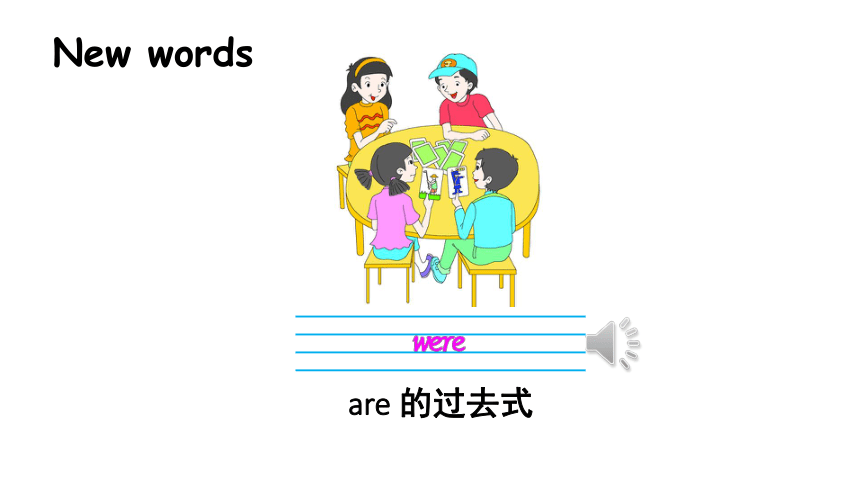
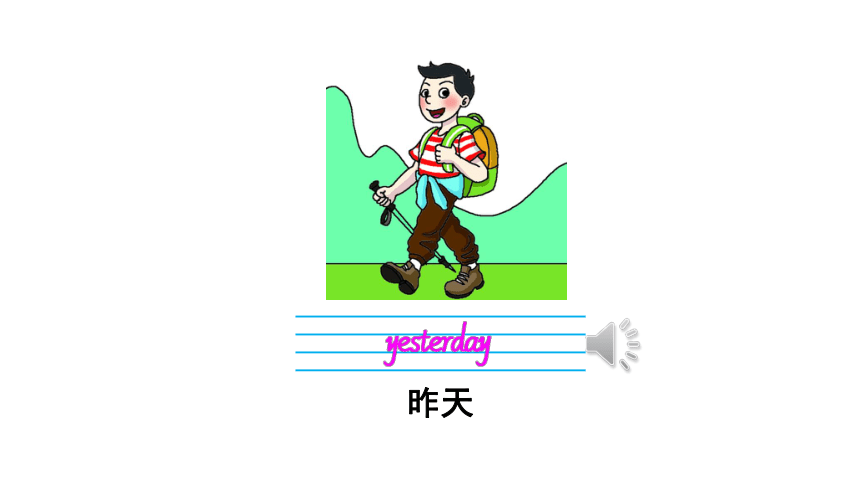
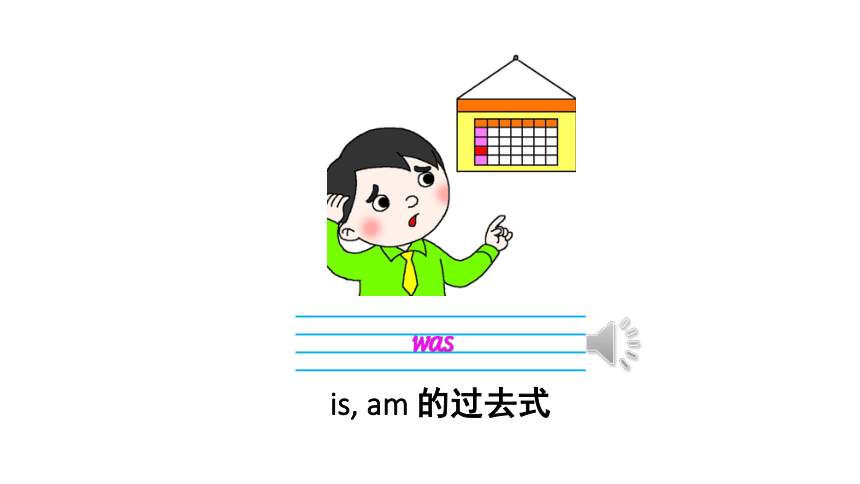
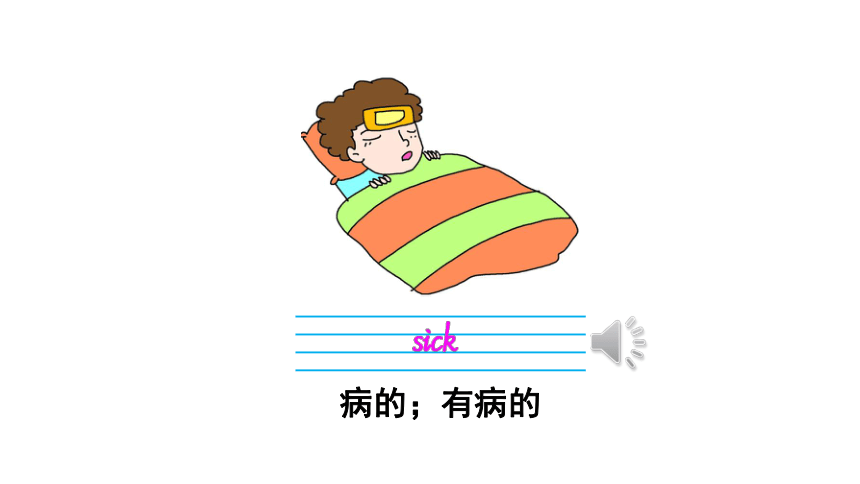
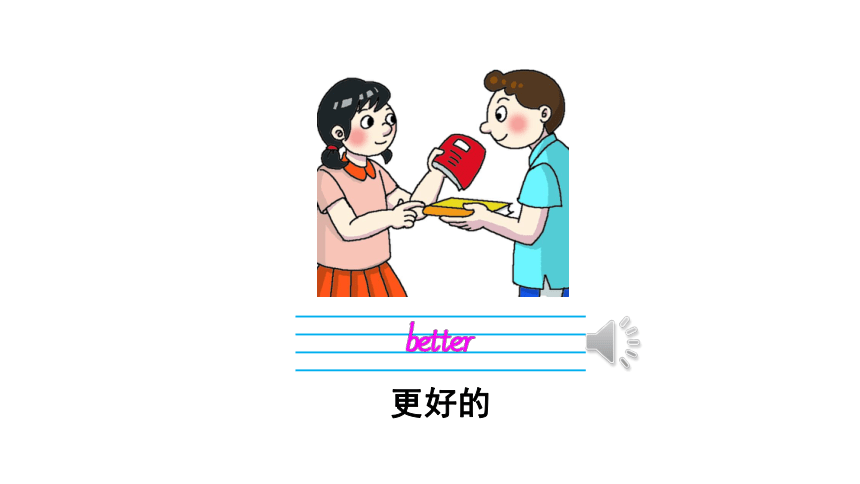
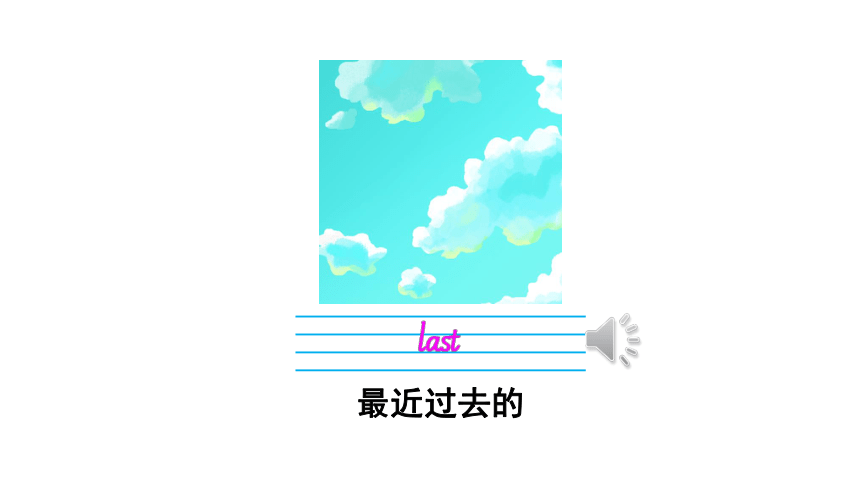
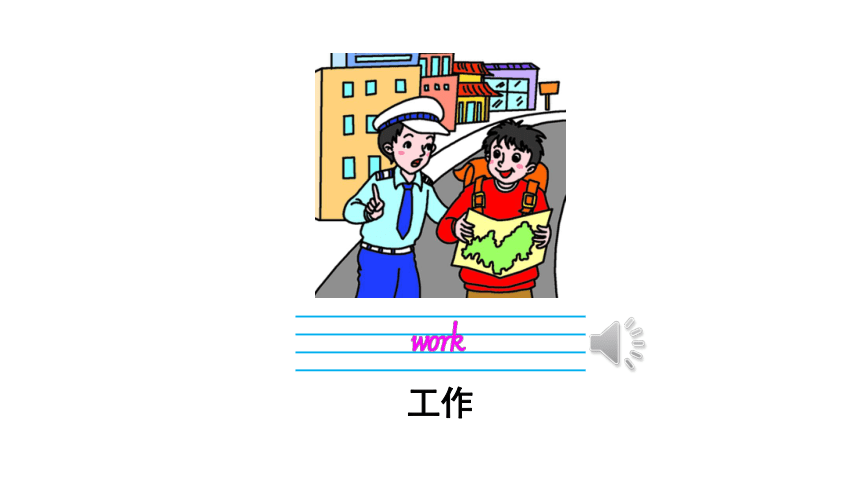
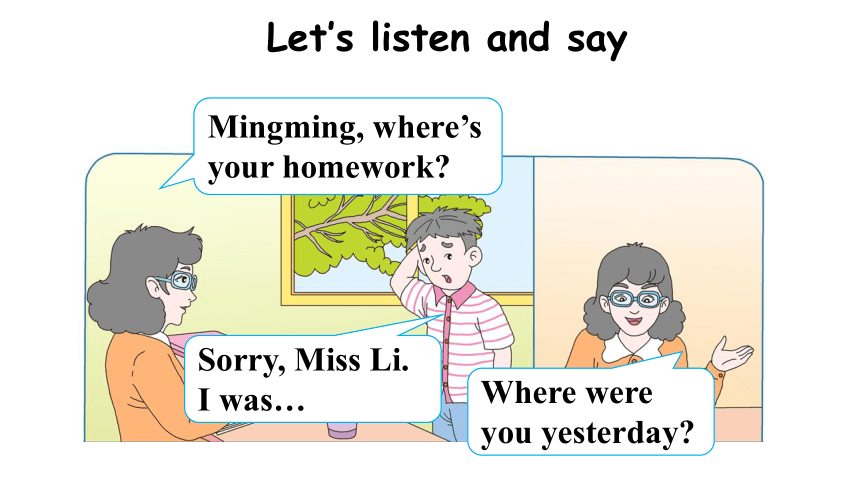
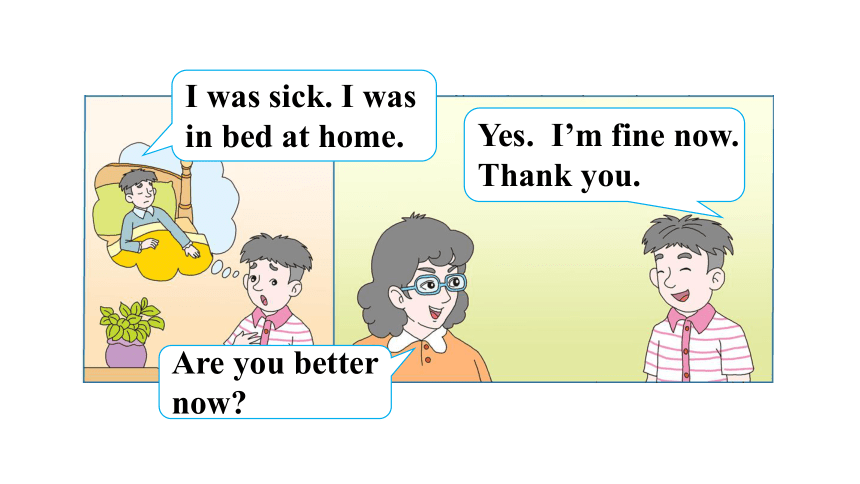
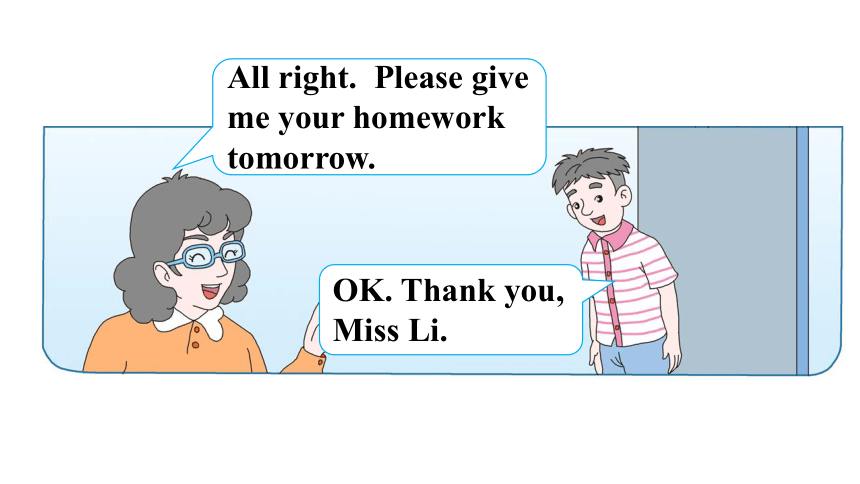

文档简介
(共41张PPT)
Unit
10
Where
were
you
yesterday?
湘少版·五年级下册
are
的过去式
New
words
昨天
is,
am
的过去式
病的;有病的
更好的
最近过去的
工作
Mingming,
where’s
your
homework?
Sorry,
Miss
Li.
I
was…
Where
were
you
yesterday?
Let’s
listen
and
say
I
was
sick.
I
was
in
bed
at
home.
Are
you
better
now?
Yes.
I’m
fine
now.
Thank
you.
All
right.
Please
give
me
your
homework
tomorrow.
OK.
Thank
you,
Miss
Li.
Language
points
—Where
were
you
yesterday?
你昨天在哪里?
—I
was
sick.
I
was
in
bed
at
home.
我病了,在家卧床休息。
(1)be
动词的过去式有两个:
was
和were。
was
主要用于主语是第一人称单数或则是第三人称
单数的情况;
were
用于主语是第二人称或者复数
形式的情况。
例句:Tom
was
in
Changsha
last
year.
去年汤姆在长沙。
拓展:
be
动词的过去式的否定形式:是在其后面加not,构成was
not/wasn’t,
were
not/
weren’t
。
疑问句形式:把was
/
were
提到句首,句尾加问号。
(2)含be动词的一般过去时的特殊疑问句的用法
句型结构:Where
+
was/
were
+
主语+
其他?
某人在哪里?
例句:她昨天在什么地方?
Where
was
she
yesterday?
她在武汉。
She
was
in
Wuhan.
2.
Please
give
me
your
homework
tomorrow.
请你明天把你的家庭作业给我。
give
sb.
sth.
=
give
sth.
to
sb.
给某人某物
例句:你能给我一张纸吗?
Can
you
give
me
a
piece
of
paper?
=
Can
you
give
a
piece
of
paper
to
me?
注意:区分
give
sth.
to
sb.
和buy
sth.
for
sb.
give
表示一个方向性的动作,给某人必然要指向这个人,所以要用to。
buy
是为某人买,不表示方向性,主要强调“买给某人”或“为某人买”,所以用for。
Let’s
learn
I
was…
I
am…
I
will
be…
last
week
yesterday
today
tomorrow
明天
上周
昨天
今天
in
hospital
at
work
at
home
in
bed
在床上
在工作中
在家里
在医院
Let’s
practise
Where
were
you
yesterday?
I
was
at
home.
Where
were
you?
Name
Time
Yesterday
Last
week
Last
month
Group
work
Where
were
you
yesterday?
I
was
sick.
I
was
in
bed
at
home.
Where
were
you
last
week?
I
was
in
Beijing.
Where
will
you
be
tomorrow?
I
will
be
in
my
aunt’s
home.
Let’s
read
Last
week,
Mr
White
was
in
China.
He
went
to
four
cities.
He
was
in
Beijing
on
Monday
and
Tuesday.
He
visited
the
Great
Wall.
He
was
in
Hangzhou
on
Wednesday.
He
saw
a
beautiful
lake,
the
West
Lake.
He
was
happy.
Beijing
Hangzhou
And
on
Thursday,
Mr
white
went
to
Guangzhou.
the
food
there
was
very
nice.
He
liked
it
very
much.
The
last
city
was
Kunming.
The
weather
in
Kunming
was
sunny
and
warm.
And
people
were
kind
to
him.
Mr
White
said,
“I
love
the
cities
and
I
love
China!”
Kunming
Guangzhou
1.
What
cities
did
Mr
White
visit?
2.
Why
did
he
feel
happy
in
Hangzhou?
3.
Did
he
like
the
food
in
Guangzhou?
4.
Why
did
Mr
White
love
China?
Answer
the
questions.
1.
What
cities
did
Mr
White
visit?
2.
Why
did
he
feel
happy
in
Hangzhou?
Because
he
saw
a
beautiful
lake,
the
West
Lake.
He
went
to
Beijing,
Hangzhou,
Guangzhou
and
Kunming.
3.
Did
he
like
the
food
in
Guangzhou?
4.
Why
did
Mr
White
love
China?
Yes,
he
did.
Because
he
loved
the
cities
in
China.
Language
points
He
visited
the
Great
Wall.
他参观了长城。
此句为一般过去时态。visited
是实义动词visit的过去式。
此句句式为:
主语
+
实义动词过去式+
其他。表示过去某个时间发生的动作或状态。
例如:我上周末去爬山了。
I
went
to
climb
the
mountain
last
weekend.
一般疑问句:
Did
+
主语
+
动词原形
+
其他?
肯定回答:
Yes,
主语+
did
否定回答:
No,
主语+
didn’t
过去式的形式
He
visited
the
Great
Wall.
他参观了长城。
一般疑问句:
Did
he
visit
the
Great
Wall?
肯定回答:
Yes,
he
did.
否定回答:
No,
he
didn’t.
(1)一般情况下在动词原形后加
ed.
如:
worked
,
looked,
…
(2)以e
结尾的动词,
直接加-d.
如:
lived,
…
(3)以辅音字母加y
结尾的动词,
先将y
变
i
再加-ed.
如:
carried,
studied,…
拓展:规则动词过去式的变化规律
(4)以重读闭音节结尾且末尾只有一个辅音字母
的,
双写此辅音字母后再加-ed.
如:
stopped,
planned,…
(1)在清辅音后读作[t]。
如:asked,
helped,
watched,
stopped
(2)在浊辅音和元音后读作[d]。
如:enjoyed,
studied,
moved,
called
规则动词的过去式的读音规律
(3)在t
/
d后读作[id]。
如:wanted,
needed
Let’s
write
Last
month,
Mr
Black
visited
four
cities
in
China.
Please
look
at
the
form
and
fill
in
the
blanks.
Beijing
Changsha
Sanya
Xi’an
windy
rainy
sunny
cloudy
1.
The
weather
in
Beijing
was________________.
2.
The
weather
in
Changsha
________________.
3.
The
weather
____________________________.
4.
_______________________________________.
windy
was
rainy
in
Sanya
was
sunny
The
weather
in
Xi’an
was
cloudy.
Let’s
have
fun
Where
were
you,
little
lady,
little
lady,
little
lady?
Where
were
you,
little
lady,
little
lady,
yester-day?
I
was
at
home,
sir,
at
home,
sir,
at
home,
sir,
at
home.
I
was
at
home,
sir,
at
home,
sir,
at
home
yester-day.
Sing
together
Where
Were
You?
Unit
10
Where
were
you
yesterday?
湘少版·五年级下册
are
的过去式
New
words
昨天
is,
am
的过去式
病的;有病的
更好的
最近过去的
工作
Mingming,
where’s
your
homework?
Sorry,
Miss
Li.
I
was…
Where
were
you
yesterday?
Let’s
listen
and
say
I
was
sick.
I
was
in
bed
at
home.
Are
you
better
now?
Yes.
I’m
fine
now.
Thank
you.
All
right.
Please
give
me
your
homework
tomorrow.
OK.
Thank
you,
Miss
Li.
Language
points
—Where
were
you
yesterday?
你昨天在哪里?
—I
was
sick.
I
was
in
bed
at
home.
我病了,在家卧床休息。
(1)be
动词的过去式有两个:
was
和were。
was
主要用于主语是第一人称单数或则是第三人称
单数的情况;
were
用于主语是第二人称或者复数
形式的情况。
例句:Tom
was
in
Changsha
last
year.
去年汤姆在长沙。
拓展:
be
动词的过去式的否定形式:是在其后面加not,构成was
not/wasn’t,
were
not/
weren’t
。
疑问句形式:把was
/
were
提到句首,句尾加问号。
(2)含be动词的一般过去时的特殊疑问句的用法
句型结构:Where
+
was/
were
+
主语+
其他?
某人在哪里?
例句:她昨天在什么地方?
Where
was
she
yesterday?
她在武汉。
She
was
in
Wuhan.
2.
Please
give
me
your
homework
tomorrow.
请你明天把你的家庭作业给我。
give
sb.
sth.
=
give
sth.
to
sb.
给某人某物
例句:你能给我一张纸吗?
Can
you
give
me
a
piece
of
paper?
=
Can
you
give
a
piece
of
paper
to
me?
注意:区分
give
sth.
to
sb.
和buy
sth.
for
sb.
give
表示一个方向性的动作,给某人必然要指向这个人,所以要用to。
buy
是为某人买,不表示方向性,主要强调“买给某人”或“为某人买”,所以用for。
Let’s
learn
I
was…
I
am…
I
will
be…
last
week
yesterday
today
tomorrow
明天
上周
昨天
今天
in
hospital
at
work
at
home
in
bed
在床上
在工作中
在家里
在医院
Let’s
practise
Where
were
you
yesterday?
I
was
at
home.
Where
were
you?
Name
Time
Yesterday
Last
week
Last
month
Group
work
Where
were
you
yesterday?
I
was
sick.
I
was
in
bed
at
home.
Where
were
you
last
week?
I
was
in
Beijing.
Where
will
you
be
tomorrow?
I
will
be
in
my
aunt’s
home.
Let’s
read
Last
week,
Mr
White
was
in
China.
He
went
to
four
cities.
He
was
in
Beijing
on
Monday
and
Tuesday.
He
visited
the
Great
Wall.
He
was
in
Hangzhou
on
Wednesday.
He
saw
a
beautiful
lake,
the
West
Lake.
He
was
happy.
Beijing
Hangzhou
And
on
Thursday,
Mr
white
went
to
Guangzhou.
the
food
there
was
very
nice.
He
liked
it
very
much.
The
last
city
was
Kunming.
The
weather
in
Kunming
was
sunny
and
warm.
And
people
were
kind
to
him.
Mr
White
said,
“I
love
the
cities
and
I
love
China!”
Kunming
Guangzhou
1.
What
cities
did
Mr
White
visit?
2.
Why
did
he
feel
happy
in
Hangzhou?
3.
Did
he
like
the
food
in
Guangzhou?
4.
Why
did
Mr
White
love
China?
Answer
the
questions.
1.
What
cities
did
Mr
White
visit?
2.
Why
did
he
feel
happy
in
Hangzhou?
Because
he
saw
a
beautiful
lake,
the
West
Lake.
He
went
to
Beijing,
Hangzhou,
Guangzhou
and
Kunming.
3.
Did
he
like
the
food
in
Guangzhou?
4.
Why
did
Mr
White
love
China?
Yes,
he
did.
Because
he
loved
the
cities
in
China.
Language
points
He
visited
the
Great
Wall.
他参观了长城。
此句为一般过去时态。visited
是实义动词visit的过去式。
此句句式为:
主语
+
实义动词过去式+
其他。表示过去某个时间发生的动作或状态。
例如:我上周末去爬山了。
I
went
to
climb
the
mountain
last
weekend.
一般疑问句:
Did
+
主语
+
动词原形
+
其他?
肯定回答:
Yes,
主语+
did
否定回答:
No,
主语+
didn’t
过去式的形式
He
visited
the
Great
Wall.
他参观了长城。
一般疑问句:
Did
he
visit
the
Great
Wall?
肯定回答:
Yes,
he
did.
否定回答:
No,
he
didn’t.
(1)一般情况下在动词原形后加
ed.
如:
worked
,
looked,
…
(2)以e
结尾的动词,
直接加-d.
如:
lived,
…
(3)以辅音字母加y
结尾的动词,
先将y
变
i
再加-ed.
如:
carried,
studied,…
拓展:规则动词过去式的变化规律
(4)以重读闭音节结尾且末尾只有一个辅音字母
的,
双写此辅音字母后再加-ed.
如:
stopped,
planned,…
(1)在清辅音后读作[t]。
如:asked,
helped,
watched,
stopped
(2)在浊辅音和元音后读作[d]。
如:enjoyed,
studied,
moved,
called
规则动词的过去式的读音规律
(3)在t
/
d后读作[id]。
如:wanted,
needed
Let’s
write
Last
month,
Mr
Black
visited
four
cities
in
China.
Please
look
at
the
form
and
fill
in
the
blanks.
Beijing
Changsha
Sanya
Xi’an
windy
rainy
sunny
cloudy
1.
The
weather
in
Beijing
was________________.
2.
The
weather
in
Changsha
________________.
3.
The
weather
____________________________.
4.
_______________________________________.
windy
was
rainy
in
Sanya
was
sunny
The
weather
in
Xi’an
was
cloudy.
Let’s
have
fun
Where
were
you,
little
lady,
little
lady,
little
lady?
Where
were
you,
little
lady,
little
lady,
yester-day?
I
was
at
home,
sir,
at
home,
sir,
at
home,
sir,
at
home.
I
was
at
home,
sir,
at
home,
sir,
at
home
yester-day.
Sing
together
Where
Were
You?
同课章节目录
- Unit 1 We are going to read stories.
- Unit 2 We are going to do some research.
- Unit 3 Let's make a kite.
- Assessment Ⅰ
- Unit 4 Don't talk here.
- Unit 5 When’s your birthday?
- Unit 6 I'll make a beautiful card.
- Assessment Ⅱ
- Unit 7 There's a post office near my school.
- Unit 8 Can you show me the way to the xin hua Hote
- Unit 9 He's kind to Children.
- Assessment Ⅲ
- Unit 10 Where were you yesterday?
- Unit 11 Who was first?
- Unit 12 Where did you go?
- Assessment Ⅳ
